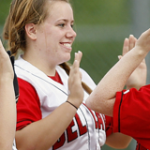Harvard College Sample Essay 2016-2017
In keeping with CollegeVine’s goal of democratizing the admissions process, we’ll be sharing real essays, sourced from our consultants’ applications that demonstrate effective storytelling strategies, major mistakes to avoid, and compelling essay topics. You’ll learn the difference between the essay of a rejected student and that of an admitted student, and you can pick up some valuable tricks that you can use in your own essays along the way.
This essay is a response to Harvard’s open essay prompt by a student who was ultimately rejected. Since this essay is optional, and there is no specific topic to which applicants may respond, the essay can be fairly open ended. (If you are planning on applying to Harvard, check out our guide to writing the optional supplemental essay.)
Have you ever been the most clothed person on a chilly morning, and yet felt by far the most ‘naked’? Walking onto the pool deck my pre-freshman year summer, not only did I have no clue how the sport of water polo worked, I barely swam up until that first summer practice. Thus, it came as no surprise that I stuck out like a sore thumb, wearing my swimming trunks amongst a crowd of speedos. I am proud to say that to this day, I have stuck with the sport, and it has been a life changing experience.
Water polo has played a huge role in shaping my character and mental endurance these past four years. When I began practicing, most of my teammates were already playing with each other regularly, so while they swam with ease, I would sputter and gasp through the warm up. However, a sense of pride, dedication, and grit kept me in the sport – a desire to prove to myself that I can surpass the obstacles lying ahead of me. Before water polo, I had done Judo for 5 years, which involved rigorous training and full contact matches. I brought the same commitment to continuous self-improvement that I did to Judo, and that helped me succeed in water polo. Today, my teammates respect me as a player known for exceptional shooting, ball handling, and leadership. With my coach’s guidance, I became a co-captain of the JV team and, later, a contributing member of the varsity team that won the league title twice, the division title twice, and placed third in the statewide tournament. My work-horse mentality even carried through swim season; I went from a 1:16 minute 100-yard swim as a freshman to under a minute by sophomore year. It’s virtually unheard of to drop seventeen seconds off of a swim time within a year. Of course, this was easier since I was a rookie at swimming, but it took dedication.
Thanks to water polo, I was able to engage in a professional program and develop life long friends. Being around peers who supported me through every day of tough training helped me build confidence, and I became more social and involved out of the pool. If I could survive this program, what is there that I can not achieve? Taking initiative, I pursue every opportunity possible and give each one a 100%, including participation in extracurricular like Debate and Journalism. I plan to keep this mentality throughout my life, and hopefully continue to succeed in a variety of challenges down the road.
Want to learn what Harvard University will actually cost you based on your income? And how long your application to the school should take? Here’s what every student considering Harvard University needs to know.
What the author does well
The author opens his essay with an anecdote, which can be a very effective way to start off any piece of writing. As we explain in our guide to using rhetorical devices in college essays, personal stories help set the scene for and engage the reader. Although the author only uses a story at the beginning of his piece, anecdotes can also be a useful way of keeping the reader’s interest peaked throughout the essay.
Additionally, the author uses some excellent imagery in his essay. This is especially true in his initial anecdote, where he sets up the scene of his first water polo practice, noting that he “stuck out like a sore thumb, wearing my swimming trunks amongst a crowd of speedos.” His details and metaphor help the reader understand how he felt and keep the reader engaged and invested in the narrative. Although the reader probably hasn’t gone through exactly what the author describes, feeling frightened, embarrassed, or out of place, is a pretty common experience. Describing the experience as feeling “naked” helps connect the reader with the situation at hand, since although standing naked before the crowd is also not a typical occurrence, everyone knows and recognizes that fear and the nightmarish feelings associated with it.
He also uses great details throughout to connect valuable aspects of his life to the general theme and the lessons he learned. For example, he explains how water polo helped him better develop other aspects of his life and gain skills that encouraged him to succeed beyond the sports arena.
What the author could improve
While it’s a good idea to tie together experiences, as the author has done, his connections between water polo and activities like debate and journalism are tenuous. Throwing in other accomplishments that don’t really relate to the topic of your essay is likely to detract from your overall essay, and admissions committees will see through it.
Additionally, throughout the essay, the author struggles a bit with language. This is especially evident in his word choice; sometimes the words are not the correct choices for what he is trying to convey, hard to understand in the context, or just not the best ones to use given his intended meaning.
For example, “the most clothed person” sounds a little odd, when a more familiar phrase like “bundled up” or “overly dressed” might work a little better. Likewise, he might replace “my pre-freshman year summer” with “the summer before my freshman year,” since the latter phrase sounds less awkward.
Another issue with which the author seems to struggle is sentence structure. In this case, some of the sentences are abrupt, run-ons, or just plain confusing. For instance, the sentence, “However, a sense of pride, dedication, and grit kept me in the sport – a desire to prove to myself that I can surpass the obstacles lying ahead of me.” The second part of this sentence in particular doesn’t flow well or make logical sense—as it stands now, it is a fragment that leaves the reader confused.
Furthermore, there are many cliché phrases throughout the essay, such as, “I pursue every opportunity possible and give each one a 100%.” This comes across as a bit trite, and the author would do better to use more creative language and sentence structures. Remember, admissions committees have to read thousands of these, so it’s your job to keep their interest peaked.
The author might also pay closer attention to his verb choices and tense throughout the essay. He occasionally employs passive voice (e.g. “known for exceptional shooting”) or overuses “be” (e.g. “had been”).
The applicant could resolve some of these language issues through self-editing. One way to self-edit your essay is to read it aloud, as we discuss in “5 DIY Tips for Editing Your Own College Essays.” Not only will this help you check the essay for flow—something that is easier to evaluate when you hear the words out loud—but it can also help you catch grammar mistake, misspellings, or odd sentence structures.
If writing is not your strength, you might also ask other people to read your essay. Of course, it is important to remember that not everyone is a natural college essay editor, so be sure to follow the tips we offer in our guide to choosing readers.
Another note
If you are a high school athlete like the author of this essay, you might be tempted to write your essay on sports or the lessons you’ve learned from playing them. This is a topic admissions committees see quite a bit, so it may come off as cliché. That isn’t to say you need to avoid the topic all together, but if you do choose to write your essay on sports, you will need to use a unique angle, avoiding themes like what you’ve learned about teamwork or other life lessons gleaned from the playing field.
Next steps
Want help with your college essays to improve your admissions chances? Sign up for your free CollegeVine account and get access to our essay guides and courses. You can also get your essay peer-reviewed and improve your own writing skills by reviewing other students’ essays.
For general tips and advice on writing your college essays, check out some of the posts below.
How to Write the Common App Essays 2016-2017
How Important is the College Essay?
How to Answer Rapid Fire Essay Questions
Mastering the Personal Statement: How to Be Confident Without Being Overconfident
How to Write the “Why Us” College Essay
Where to Begin? 3 Personal Essay Brainstorming Exercises
5 DIY Tips for Editing Your Own College Essays
How to Write Fewer College Essays
What If I Don’t Have Anything Interesting to Write About in My College Essay?
Whom Should I Ask for Help with My College Essay?
How to Use Rhetorical Device in Your College Essay
Looking for help on essays for specific colleges? Read our essay breakdowns for tips on responding to prompts from individual schools.


